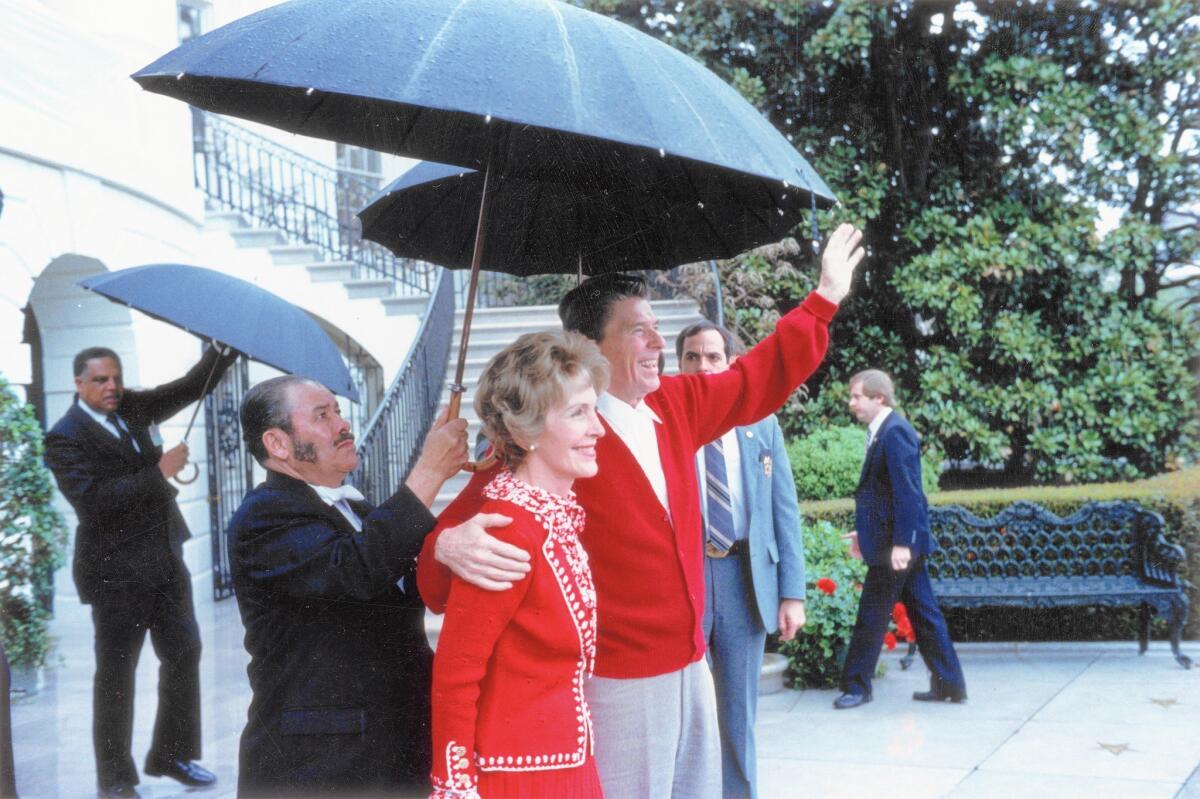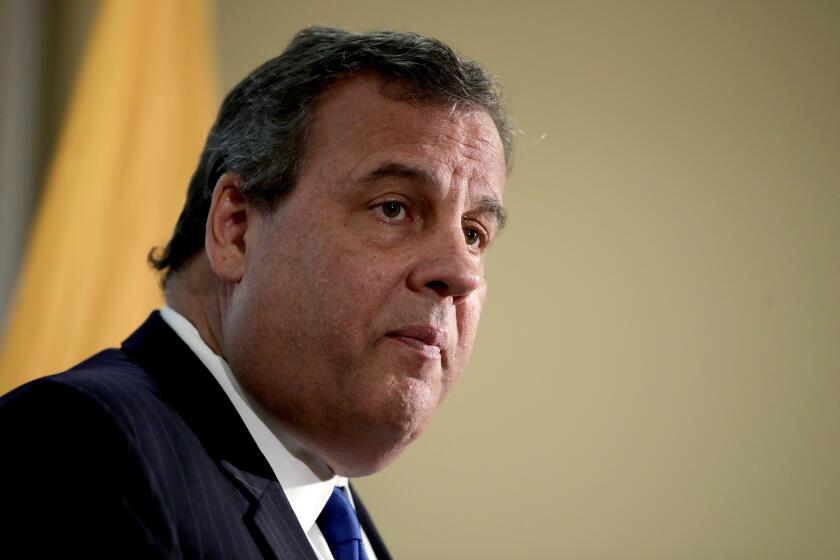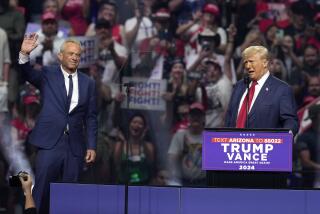When Reagan was shot, country rallied around, but he hadn’t spent months downplaying assassins

WASHINGTON — When President Reagan was shot and nearly killed by a would-be assassin, the country rallied around him. But he also hadn’t spent eight months downplaying the threat of deranged gunmen.
With President Trump’s announcement that he and his wife had tested positive for the coronavirus, I thought back to the last time the country confronted a major presidential health scare and what we might learn from those dramatic few days in the spring of 1981.
Reagan was shot by John W. Hinckley Jr. on March 30, 1981, as the president and his entourage left the Washington Hilton, where he had given a speech to union members. It was just 70 days into Reagan’s first term.
Hinckley, standing 15 feet from the president, unleashed six shots in 1.7 seconds. He wounded three men — Press Secretary James Brady, D.C. Police Officer Thomas K. Delahanty and Secret Service Agent Tim McCarthy — before his final shot deflected off the side of the limo and hit Reagan in the left side.
Thanks to the quick actions and thinking of his lead Secret Service agent, Jerry Parr, the president was rushed to George Washington University Hospital. He was in bad shape. Doctors and nurses did not expect him to live. He collapsed upon walking into the emergency room, and a nurse could not detect his pulse.
In the end, Reagan survived thanks to the heroic actions of his Secret Service detail and the doctors and nurses at the hospital. It was a close call: Reagan lost more than half his blood volume, and doctors would pluck a mangled bullet from his chest, an inch from his heart.
But he emerged from the ordeal with a much stronger bond with the public, one that stayed with him through the rest of his presidency.
Whether Trump can gain similar sympathy is very much in doubt — not only because of the events leading up to his illness, but also the sharp differences between the personalities of the two men, which can be seen by their immediate reactions to their health crises.
Follow along here for the latest about Trump’s positive coronavirus test and what the news means for the presidential campaign.
Not long after he was rushed to the hospital, with a chest tube in his side draining copious amounts of blood, Reagan spotted his wife enter the trauma bay.
“Honey, I forgot to duck,” he said, reprising a famous remark made by boxer Jack Dempsey after he lost the heavyweight championship in 1926.
As he was being wheeled into surgery he passed his three top advisors and joked, “Who’s minding the store?”
Just before surgeons started their operation to remove the bullet and stop the bleeding, Reagan dramatically rose on an elbow and said, “I hope you are all Republicans.”
White House officials made sure those jokes and quips were quickly disseminated to the press. The public knew what they signified: Reagan was brave, as well as concerned about those around him. His first instinct was to calm his wife. He joked with the doctors to calm their nerves. He could tell they were all on edge.
After surgery, Reagan traded notes with observations and wisecracks with his nurses, further cementing his reputation as calm in the face of danger.
His popularity soared.
“What happened to Reagan on Monday is the stuff of which legends are made,” the late and esteemed Washington Post political writer David Broder wrote as Reagan recovered.
Three decades later in an interview for my book on the assassination attempt, Broder said Reagan “was politically untouchable from that point on.”
“He became a mythic figure,” Broder said. The public’s affection for Reagan saved him from the dire consequences of the Iran-Contra scandal, he added.
Can we expect a similar leap in empathy and popularity for Trump?
The country then wasn’t nearly as polarized and divided as it is now. The first visitor outside of his family and close advisors permitted to see Reagan was Rep. Thomas P. “Tip” O’Neill, the liberal Democratic House speaker. O’Neill went straight to Reagan’s bed, grabbed the president’s hand and kissed his head. Then the speaker knelt and together they recited Psalm 23 —“The Lord is my shepherd; I shall not want.”
Such a moment almost surely could not happen today — and not only because the president is in quarantine, the victim of a pandemic he has spent months minimizing and wishing away.
If he is well enough, we can ponder whether Trump will act with humility, dignity and grace, like Reagan did. Can we expect self-deprecating tweets from his sickbed that might help cement a bond between a suffering president and the electorate?
Trump’s actions after his diagnosis also contrast with Reagan’s. He has remained silent on Twitter, his main channel of communication, since he announced his diagnosis just before 1 a.m. Friday in Washington. He also skipped a conference call on Friday with governors.
Reagan’s White House, on the other hand, wanted to show that the president was fully in command, even from his hospital bed. The morning after he was shot, after a fitful night in the recovery room, Reagan signed a bill to block farm subsidies to dairy farmers. A White House spokesman told reporters that the action proved “that Reagan is fulfilling the duties of the presidency in spite of being shot in an assassination attempt Monday,” the Associated Press reported.
Trump’s doctor, Sean Conley, says that the president and first lady are ‘both well at this time’ and will convalesce at the White House.
Reagan had a solid team helping him manage the crisis; his chief of staff, James A. Baker III, was probably the best ever to occupy that job. His vice president, George H.W. Bush, was cool under pressure. Though the administration did not invoke the 25th Amendment by transferring power from an incapacitated Reagan (he was unconscious in surgery) to the vice president, Bush essentially ran the government until Reagan was discharged from the hospital 12 days after the shooting.
Even so, the White House bungled aspects of its response. A White House press secretary couldn’t answer basic facts about the president’s condition, sparking confusion and alarm. Al Haig, the secretary of state, famously mangled the line of succession. Though doctors initially downplayed the seriousness of the injuries (Reagan actually came within a minute or two of dying), they eventually provided a fairly complete and detailed analysis of how they treated the president and his prognosis for recovery.
Despite those missteps, the public was willing to trust Reagan’s doctors and his young administration.
There, too, the contrast with the Trump administration is clear. The current White House has squandered its credibility through nearly four years of repeated falsehoods and disinformation.
Reagan grew from the experience. In his diary, he wrote he prayed for the man who shot him. The day fundamentally transformed the president’s worldview. He believed his life had been spared by God for a reason — to reduce the threat of nuclear war.
Do we expect Trump to evolve, to empathize more with those who caught the virus? To date, there’s little evidence of that, but the example of Reagan might stand Trump and his White House in good stead.
Del Quentin Wilber is the author of Rawhide Down: The Near Assassination of Ronald Reagan.
More to Read
Get the L.A. Times Politics newsletter
Deeply reported insights into legislation, politics and policy from Sacramento, Washington and beyond. In your inbox three times per week.
You may occasionally receive promotional content from the Los Angeles Times.












